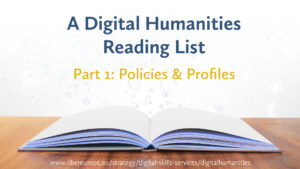A Digital Humanities Reading List: Part 1

LIBER’s Digital Humanities & Digital Cultural Heritage Working Group is gathering literature for libraries with an interest in digital humanities. Four teams, each with a specific focus, have assembled a list of must-read papers, articles and reports.
The recommendations in this article (the first in the series) have been assembled by the team in charge of Recommendations for identifying and establishing policies and profiles regarding digital humanities’ portfolios, led by Demmy Verbeke of KU Leuven.
- Digital Humanities Reading List: Part 2
- Digital Humanities Reading List: Part 3
- Digital Humanities Reading List: Part 4
When a particular topic gains traction in academic theory and practice, literature on the matter soon follows suit. No wonder then that, in recent years, we have seen the appearance of numerous scholarly articles about Digital Humanities (DH), as well as companions, handbooks, readers and journals devoted to the topic. What is more, DH practitioners typically embrace alternative forms of scholarly communication, resulting in a steady stream of blog posts and publications on collaborative platforms like GitHub or the Open Science Framework. As an academic endeavor, DH has also captured the public imagination so we find numerous newspaper or magazine articles and opinion pieces. Finally, governments, funding bodies and academic institutions have produced numerous reports and DIY manuals as they ponder if and how to support DH.
In this post, we want to highlight a few choice examples of this literature, which we found particularly informative when contemplating why DH deserves the attention of research libraries in the first place and the various ways in which it can be integrated in the day-to-day practices of these institutions.
The First Theme: Policies & Portfolios
We want to highlight a few choice examples literature which we found particularly informative when contemplating why DH deserves the attention of research libraries in the first place, and the various ways in which it can be integrated in the day-to-day practices of these institutions.
- There Is No Such Thing as ‘the Digital Humanities’, Eric Weiskott
Writing in The Chronicle of Higher Education, Weiskott argues that most debates about DH are grounded in the much-hyped crisis of the humanities and that most criticisms of DH are actually founded on misunderstandings of what DH is or is not. The use of digital technology to study the humanities is as much (and therefore just as little) a threat to the humanities as the use of print technology. - De-Centering and Recentering Digital Scholarship, Office of Digital Research and Scholarship at Florida State University
This manifesto (currently available in pre-print) highlights the many positive changes in academic practice driven by digital scholarship. It connects digital scholarship (and thus also digital humanities) with librarianship, a.o. by discussing how it transforms the role of libraries and librarians. - Special Report: Digital Humanities in Libraries, Stewart Varner and Patricia Hswe
Several studies have reported on the uptake of DH in research libraries in recent years, and Digital Humanities in Libraries examines how American libraries have dealt with DH. The report highlights a common thread in the literature (equally present in the aforementioned manifesto), namely that DH support based in the library not only offers the opportunity but even demands that the library goes beyond being a service provider and becomes a valuable – and valued – partner in research. - Skunks in the Library: a Path to Production for Scholarly R&D, Bethany Nowviskie
Probably the most influential expression of the library’s responsibility to become a partner in research is Nowviskie’s article. It describes the activities and organization of the Scholars’ Lab at the University of Virginia Library as an example of a semi-independent research-and-development lab staffed with librarians acting as scholar-practitioners.
A number of more extensive publications provide detailed advice and practical guidelines on how to organize DH support, based on experiences gathered during the last decade. Noteworthy examples include:
- SPEC Kit 350: Supporting Digital Scholarship (2016) of the Association of Research Libraries
- ECAR Working Group Paper Building Capacity for Digital Humanities. A Framework for Institutional Planning (2017)
- Christina Kamposiori’s report for RLUK: The role of Research Libraries in the creation, archiving, curation, and preservation of tools for the Digital Humanities (2017)
One of the objectives of this team’s focus on policies and portfolios of libraries in DH is to make good use of these overviews of experiences, challenges, tips and reflections to support the uptake of DH in research libraries all over Europe.
To find out more about the team and LIBER’s work in this area, see the Digital Humanities & Digital Cultural Heritage Working Group page.
Related news articles